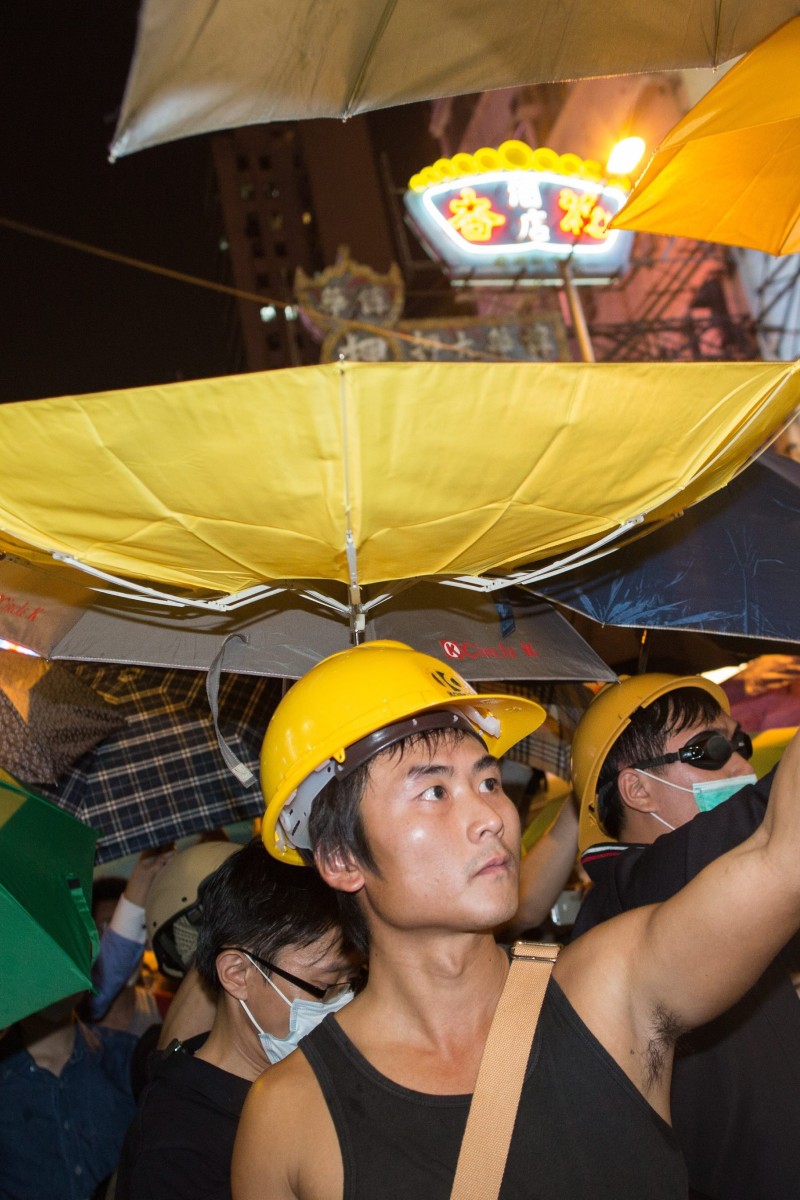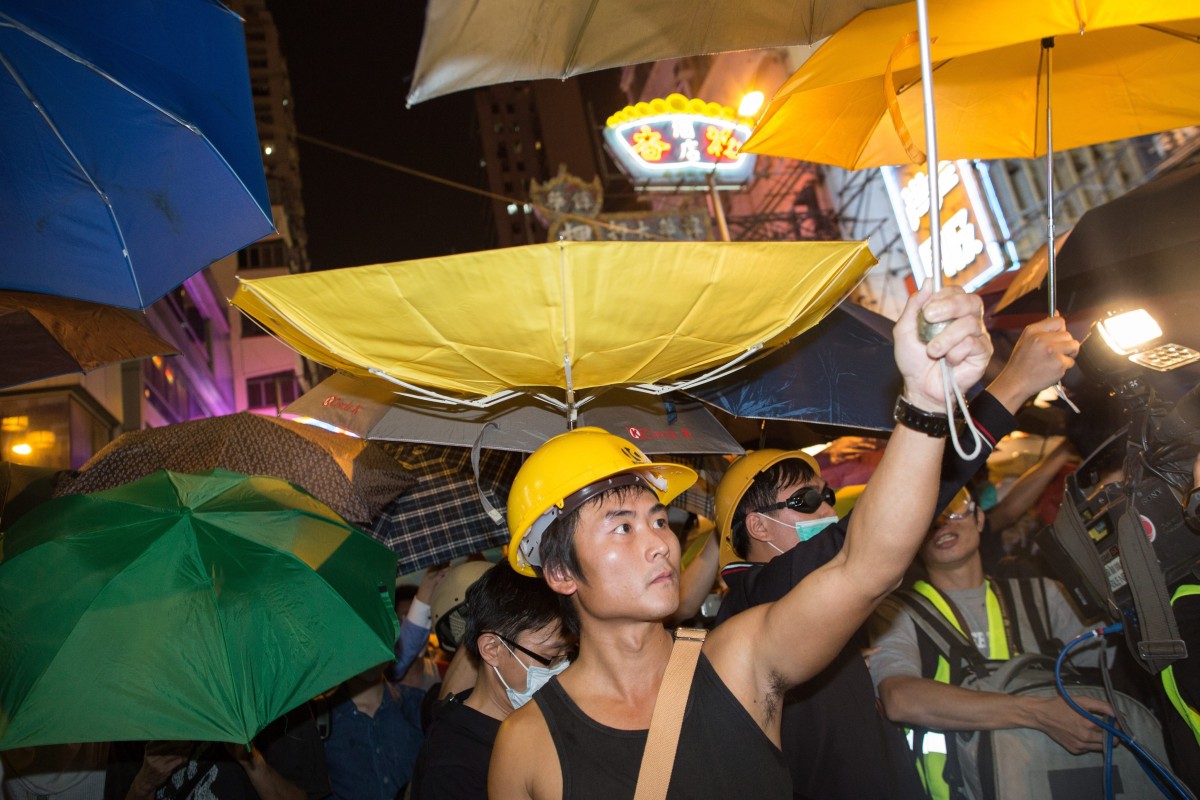
Police used pepper spray on Tuesday to move protesters from part of Hong Kong’s Mong Kok neighbourhood, but their often-tough tactics triggered hundreds more to rally to the demonstrators’ cause and take to the streets.
 Pro-democracy protesters use umbrellas to protect themselves from "tear water" used by police on demonstrators as they try to clear Portland Street in Mong kok on November 25.
Pro-democracy protesters use umbrellas to protect themselves from "tear water" used by police on demonstrators as they try to clear Portland Street in Mong kok on November 25.Police used pepper spray on Tuesday to move protesters from part of Hong Kong’s Mong Kok neighbourhood, but their often-tough tactics triggered hundreds more to rally to the demonstrators’ cause and take to the streets.
Police and pro-democracy protesters clashed repeatedly into the night, with many of the confrontations broadcast live in Hong Kong on the 58th day of the city’s protests.
Bailiffs and police were acting on a court order yesterday to clear the streets and are expected to return today to enforce a separate order that calls for a much larger area to be unblocked. But the reaction to last night's effort and their inability to reclaim much ground from the protesters suggest more clashes are likely.
Several hard-core occupiers said they were ready for whatever happens, even if they get injured or end up in jail.
"I am ready to be arrested," said James Cheng, 22, who has been camping on a Mong Kok street for the last month. "Everyone who comes out here accepts that. If you don't, you shouldn't be here."
Peaceful start
Yesterday's street clearing, announced in advance, started out relatively peacefully on a lone block in Mong Kok.
Court bailiffs, acting on a court order sought by a bus company, instructed crews in white helmets to remove barricades blocking Argyle Street. Protesters, while shouting slogans, did not obstruct them. Police looked on.
As the afternoon wore on, the atmosphere became more and more tense. Black-clad protesters sat down in the street, while blue-clad counterprotesters yelled at them from the crowded sidewalks. Two student leaders stood on a platform of pallets and demanded the bailiffs explain why so many police were there.
Police slam protesters to the ground
Police soon became directly involved, slamming protesters to the ground and carrying them and others away. By late afternoon, 32 people had been arrested, with three police injured, according to police.
Police reopened Argyle Street to traffic by 4pm. But in doing so, they pushed protesters in front of the lavish Langham Place mall. Langham Place is buzzing each day with thousands of tourists, mostly from the mainland. That resulted in a surreal scene of Chinese shoppers taking photos of pro-democracy protesters confronting police, while they stood safely behind glass windows of the mall listening to Jingle Bells and other Christmas Muzak.
Banners out
Soon after, police - many dressed in riot gear - unfurled familiar banners that read, "Stop charging, or we use force." Less familiar was the weapon they then used - a hand-pumped water blaster filled with stinging liquid. It was not immediately known what was in the liquid, but showered protesters said it felt like diluted pepper spray. "Tear water" was how they described it.
Images of the pepper-spray blasters went viral, leading to calls by student groups for help.
"More support urgently needed in Mong Kok," read a message sent out on Twitter by the Hong Kong Federation of Students. "Bring helmets, goggles, shields, umbrellas, towels & be careful!"
By 10pm, more than 80 people had been arrested, and protesters on Nathan Road could be seen building up their barricades, ready for more street battles well into the early morning. Journalists saw numerous protesters injured and carried away by paramedics and protesters, but numbers were not immediately available.
Police 'uncontrollable'
People Power lawmaker Albert Chan Wai-yip who was in the middle of the scrum, said he thought bailiffs and police did a good job on Argyle Street - until midafternoon. "Unfortunately, a few police officers were uncontrollable," he said, and after that, the situation deteriorated.
Chan said it could take days for authorities to safely carry out the court’s orders and clear a much larger number of tents and protesters occupying nearby Nathan Road.
Background and analysis
For nearly two months, students and other Hong Kong residents have occupied streets in three separate parts of Hong Kong. They are pushing back against Beijing's control of their election process, including selection of a chief executive in 2017.
Initially, the street occupations drew tens of thousands of supporters and drew international attention. But the momentum has waned partly because of splits among the protesters and frustration from Hong Kong businesses and residents over how long the protests have dragged on.
As yesterday’s events revealed, China and Hong Kong authorities also are struggling with tactics. Beijing clearly doesn't want to unleash the kind of force that would draw comparisons with the crackdown on young protesters in Tiananmen Square in 1989. Yet the longer the protests continue, the more the chance they will draw sympathisers and trigger dissent on the mainland.
In a press conference with US President Barack Obama earlier this month in Beijing, President Xi Jinping forcefully denounced what he called the "illegal" Hong Kong protests, using the same language as Chief Executive, Leung Chun-ying.
Access denied
In the last two weeks, Beijing has also blocked student leaders and other Hong Kong residents videotaped at the protests from entering the mainland. Yesterdau, Hong Kong and British news media revealed that Beijing had denied a visa to a Conservative member of the British Parliament, Peter Mandelson, because he'd led a debate on the Hong Kong protests.
The visa denial prompted a group of British parliamentarians this week to cancel a planned three-day visit to Shanghai that was to start yesterday. It also drew a response from Britain’s Foreign Office.
"The UK-China Leadership Forum has an important role in UK/China relations," said the British Foreign Office. "We have raised this with the Chinese government and sought an explanation of their decision to deny a visa."
Ironically, the visa denial comes as Hong Kong protesters are unleashing their frustrations on Britain, which turned Hong Kong over to China in 1997. In recent days, several dozen protesters have rallied outside the British consulate here. They argue that Britain hasn't pressed Beijing enough to honour a 1984 agreement that promised Hong Kong "a high degree of autonomy."